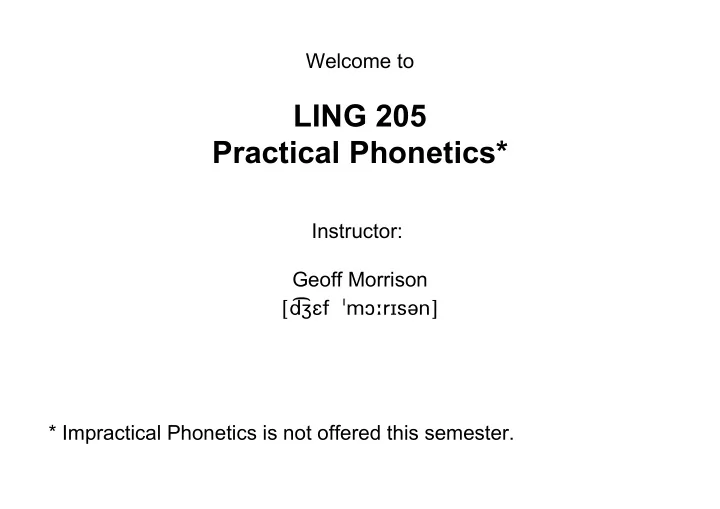

Welcome to LING 205 Practical Phonetics* Instructor: Geoff Morrison [df mrsn] * Impractical Phonetics is not offered this semester.
Definition of Phonetics? Phonetics and Phonology?
Definition of Phonetics? The study of the physical aspects of the emission, transmission, and reception of speech. - I just made this up, see if you can find other definitions. hw - What does each term in the definition mean? - Does the definition cover sign language? Should it?
Phonetics and Phonology? Traditional distinction is roughly: - Phonology happens in brain - Phonetics happens in mouth, air, and ears - Lexicon and semantic, syntactic, and morphological modules pass abstract symbols to phonological module - Phonological module manipulates abstract symbols %@&$ ÷ @%& - Phonological module passes results to phonetic module - Phonetic module produces concrete physical output
Phonetics - What’s it good for? - Who should study phonetics and why? - Practical applications?
Goals of course: Knowledge and skills that students will hopefully learn - International Phonetic Alphabet - description of speech sounds - transcription - production - Articulatory Phonetics - understand how speech is produced by vocal tract - Acoustic Phonetics - understand what sound is - basic acoustic properties of speech - Auditory / Perceptual Phonetics - understand how the ear processes sound - decoding of speech
The focus of the course will be on understanding how and why. You will get credit primarily for analytical skills (thinking) and only secondarily for memorisation. e.g., In an exam, I will not ask you to label a diagram with appropriate vocabulary items. However, I may ask you to describe the process that results in X (how), and you will be expected to use the appropriate vocabulary and possibly draw a relevant diagram. I may also ask you why this process does not result in X given circumstance Y. Exception: you will need to memorise most IPA symbols
Goals of Course: students who do well in this course should be fully prepared to: - courses - take more advanced courses in phonetics - take introductory courses in phonology - learn more on their own by - informed introspection - conducting informal experiments - reading books and articles on phonetics and phonetically-based phonology - begin applying phonetics to practical situations - language learning and teaching
Methods for achieving course goals: - lectures - lecture notes - required textbook hw - recommended reading - website hw - WebCT hw - ungraded assignments - graded assignments - quizzes - practice exam - real exam
Recommend
More recommend